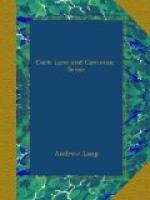As regards imposture, there exists a singular record of a legal process in Paris, 1534. {114b}
It may have been observed that the Lyons affair was useful to the Church, as against ‘the damnable sect of Lutherans,’ because Sister Alix attested the existence of purgatory. No imposture was detected, and no reader of Montalembert can doubt his good faith, nor the sincerity of his kindness and piety. But such a set of circumstances might provoke imitation. Of fraudulent imitation the Franciscans of Orleans were accused, and for this crime they were severely punished. We have the Arrest des Commissaires du Conseil d’Etat du Roi, from MS. 7170, A. of the Bibliotheque du Roi. {115} We have also allusions in the Franciscanus, a satire in Latin hexameter by George Buchanan. Finally, we have versions in Lavaterus, and in Wierus, De Curat. Laes. Maleficio (Amsterdam, 1660, p. 422). Wierus, born 1515, heard the story when with Sleidan at Orleans, some years after the events. He gives the version of Sleidan, a notably Protestant version. Wierus is famous for his spirited and valuable defence of the poor women then so frequently burned as witches. He either does, or pretends to believe in devils, diabolical possession, and exorcism, but the exorcist, to be respectable, must be Protestant. Probably Wierus was not so credulous as he assumes to be, and a point of irony frequently peeps out. The story as told by Sleidan differs from that in the official record. In this document Adam Fumee counsellor of the king, announces that the Franciscans of Orleans have informed the king that they are vexed by a spirit, which gives itself out by signs (rappings), as the wife of Francois de St. Mesmin, Provost of Orleans. They ask the king to take cognisance of the matter. On the other side, St. Mesmin declares that the Franciscans have counterfeited the affair in hope of ‘black-mailing’ him. The king, therefore, appoints Fumee to inquire into the case. Thirteen friars are lying in prison in Paris, where they have long been ’in great wretchedness and poverty, and perishing of hunger,’ a pretty example of the law’s delay. A commission is to try the case (November, 1534). The trouble had begun on February 22, 1533 (old style), when Father Pierre d’Arras at five a.m. was




